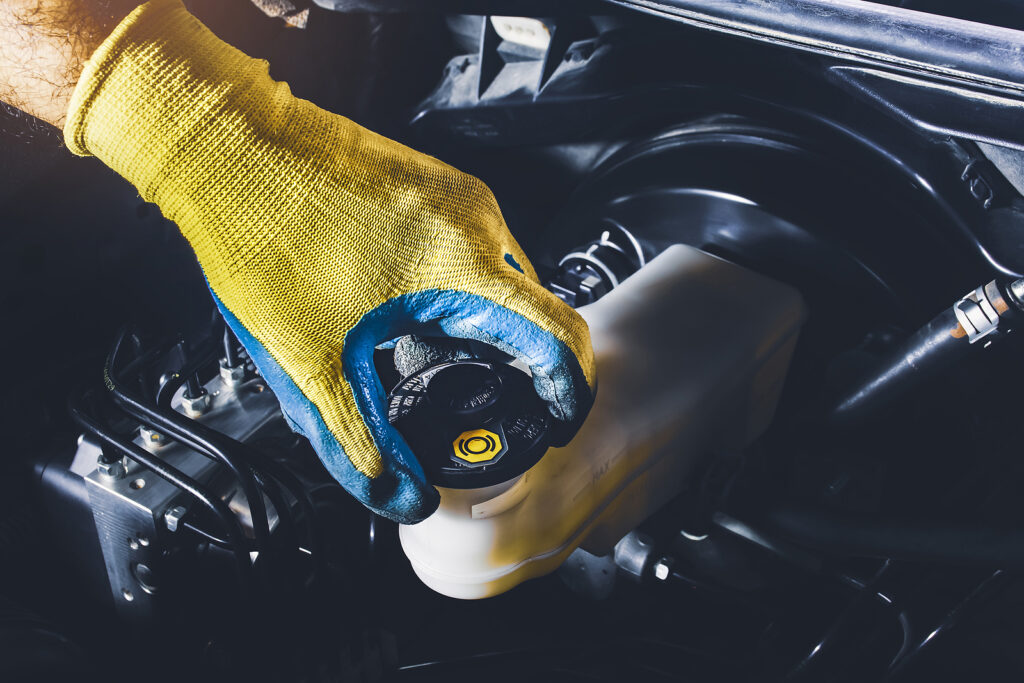Winter is still going strong, but the time of year makes no difference when it comes to car maintenance. There are many tasks to stay on top of if you wish to keep your vehicle in optimal condition, year-round. Checking on your automotive fluid levels is one of these vital car maintenance priorities.
Continue reading to learn the 5 car fluids you should check on regularly, plus where to take your vehicle for dealership-level car maintenance at neighborhood prices in Indianapolis.

Important Car Fluids
The total number of fluids in a vehicle really depends on the type, make, and model. However, virtually all automobiles require 7 to 8 design-specific fluids for optimal performance and longevity. These include fluids for the engine, brakes, transmission, radiator, power steering, battery, differential, and windshield.
The most important automotive fluids you should be checking on a regular basis, especially during the winter and summer months when the temperatures are more extreme, include the motor oil, transmission fluid, radiator fluid, brake fluid, and power steering fluid. You can refer to your vehicle’s owners’ manual for instructions on how to check each automotive fluid level.
Motor Oil
Also referred to as engine oil, your motor oil levels matter every time you turn the ignition. Engine oil is designed to lubricate the internal engine structure, thus abating friction and heat generation, which can be damaging to the engine and other automotive parts. Check your motor oil levels biweekly or monthly, depending on how often and how far you drive. Always be sure to let your engine cool completely before pulling out the oil dipstick. Get your oil changed every 3,000 to 5,000 miles, or according to your vehicle’s manufacturer’s instructions.
Radiator Fluid
Also called coolant or antifreeze, radiator fluid is responsible for regulating internal temperatures. It prevents a car engine from overheating. Coolant becomes contaminated with rust and other pollutants overtime, making it necessary to check and replace on a regular basis. Improper coolant levels or dirty radiator fluid can cause an engine to overheat, damage other internal engine components, and pose several safety risks to drivers and passengers of the vehicle.
Transmission Fluid
Automatic transmission vehicles require transmission fluid to keep the gears shifting properly. Like motor oil is a lubricant for the engine, transmission fluid acts in a similar way for the gears. Check the transmission fluid as often as you check the motor oil. Not only should you have enough fluid, but it should also be clean. Transmission fluid does degrade over time, and as a result can change colors or appear dark and dirty. Dark or black transmission fluid is dirty and requires replacing should be replaced as soon as possible.
Brake Fluid
Your vehicle’s brakes are arguably one of most important safety components. after all, they allow you to stop your 5,000 pound car when it’s moving at 60 miles an hour! Brake fluid is an essential automotive fluid because it supports the performance of your car’s braking system. If you’re brake fluid is low or poor in quality, it can affect how well your car responds to brake pressure. You should have your brake fluid checked on an annual basis, or more often if you’re experiencing any type of automotive leak.
Power Steering
Today, most vehicles are designed with power steering, and therefore, require power steering fluid. Without sufficient levels of clean, quality power steering fluid, the steering wheel will become more difficult to maneuver, and eventually will hardly be movable at all. Power steering fluid should be checked every year or two years, depending on how often you drive and the age of the vehicle.
TIPS FOR CHECKING AUTOMOTIVE FLUIDS:
↪ Refer to your owner’s manual for instructions on how to check and replace the fluids in your vehicle.
↪ Aside from a transmission fluid check, your car should be turned off and the engine should be completely cooled down before you check any automotive fluid levels.
↪ Be sure your car is parked on an even and level surface for accurate readings.
↪ Choose top quality automotive fluids that are specifically designed for the intended application.
↪ Spotting a small puddle of liquid beneath or in front of your car can be an indication of an automotive leak. Have this inspected by a licensed mechanic as soon as possible.
↪ Never forget about refilling your windshield wiper fluid. It’s very frustrating to run out when you need it most! It can also prevent traffic accidents and roadside emergencies!
↪ Overall, you should check all automotive fluids at least every month to ensure that levels are adequate, and liquids are clean.
Are you looking for a professional auto shop to provide routine car maintenance for your vehicle in place? Contact Northeast Auto Service at 317-475-1846 for ASE licensed auto service and car maintenance in Indianapolis, Indiana. Ask us about our auto repair and service promotions!
Related Posts:
When Should I Change the Oil in My Vehicle?
Common Types of Car Brake Fluid
A Simple Guide to Flushing a Car Radiator
How Often Should I Bleed My Car Brakes?

